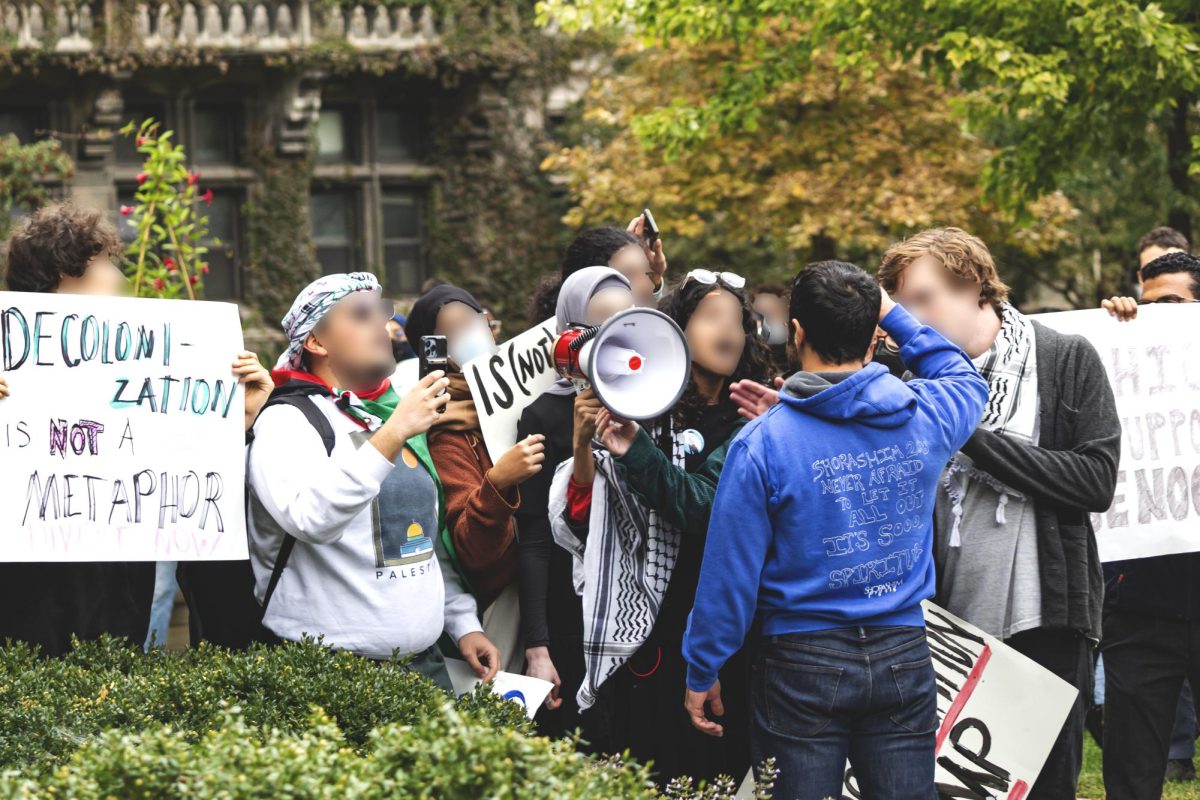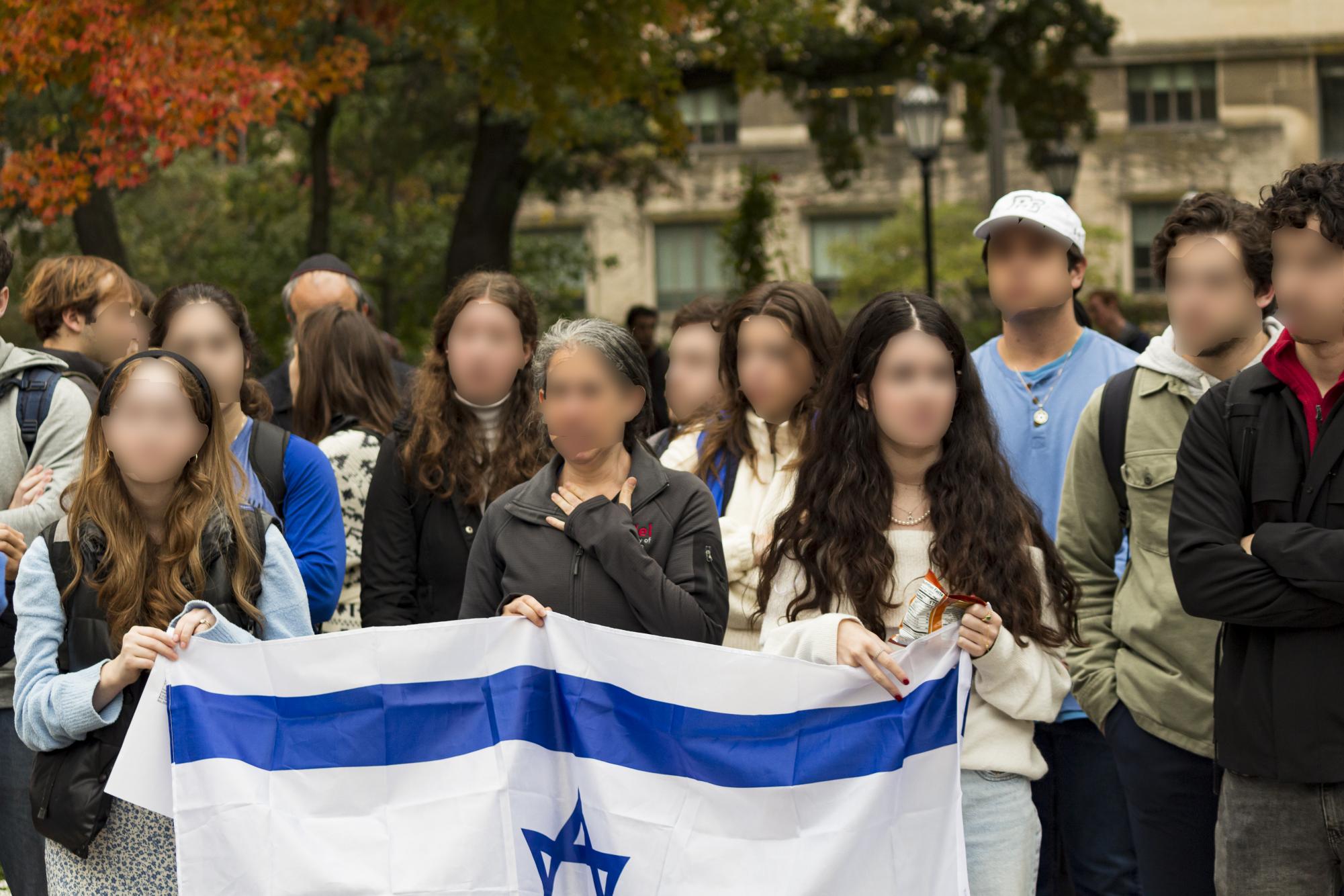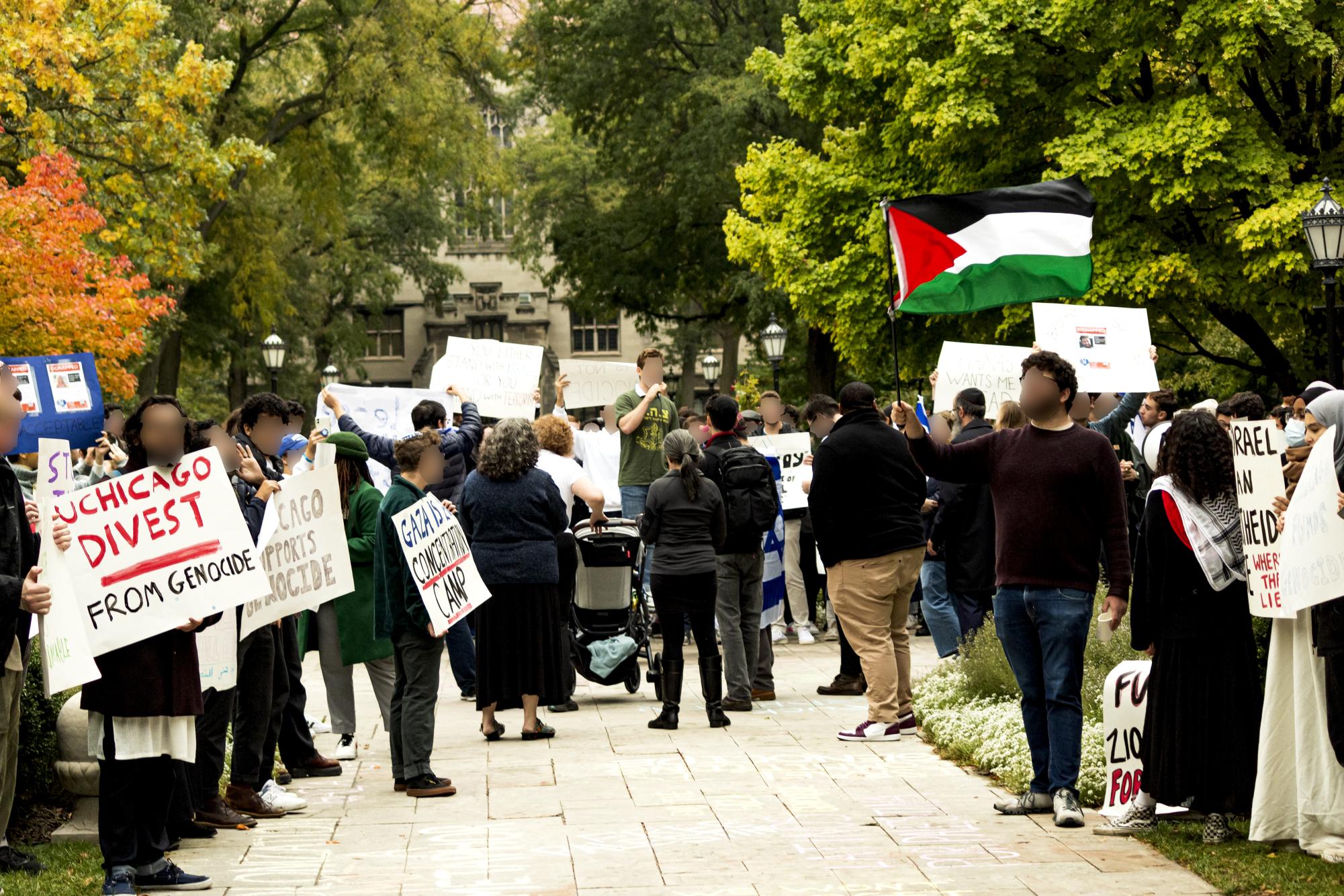
Nathaniel Rodwell-Simon
Supporters of Israel and Palestine confront each other during rallies on the quad
Content warning: This article contains mentions of antisemitism, Islamophobia, and violence.
Tension filled the center of campus Thursday afternoon as students from a collection of UChicago Jewish organizations and Students for Justice in Palestine (SJP) at UChicago demonstrated on the quad, separated by only a few feet.
A collection of UChicago Jewish organizations, including UChicago Hillel, Rohr Chabad, Law Students for Israel, the Jewish Business Student Association, UChicago Kehillah, and UChicago Maroons for Israel, organized a rally from noon to 1 p.m. at the center of the quad to express support for Israel following the October 7 attacks on the country by Hamas. This rally came as SJP continued its daily occupation of the quad, from 10 a.m. to 3 p.m., “until the genocide ends.” SJP began its daily protests on Monday, October 16.
Attendees protested for a myriad of reasons. Many had personal ties to the region. Some were Jewish, others Muslim. Some were religious leaders or in training to become religious leaders. Many hadn’t been able to focus on their work since violence erupted on October 7.
An Arab-American undergraduate student told The Maroon she joined the SJP protests on Monday and Thursday because she felt a sense of solidarity with Palestinian students.
“I’m from a country that has been oppressed before. And we did resist and we overcame our oppression, and it’s a very near and dear conversation to my heart when you talk about Palestine because of this,” she said.
“Because we’re living in a post-9/11 America, [I’m] always having conversations with people where you’re basically defending your right to be alive and begging the other side to see you as a human being,” she said.
An Israeli student who recently moved to Chicago spoke to The Maroon about her connection to the conflict.
“Last Saturday, what they call a resistance group crossed the border in order to kill civilians,” she said. “My entire family lives in Israel. Obviously, the Palestinians have the right to live and Israel does everything in its power not to target civilians, but we are facing terror, and this terror organization is rooted within civilian infrastructure. They are putting a gun against our head, and Israel has a right to defend itself.”

Tensions began to rise as an increasing number of students filtered into the quad from their classes. Speakers on both sides yelled and chanted, each attempting to drown out the other. Students supporting Israel sang in Hebrew; speakers from SJP chanted into a megaphone. Both groups waved flags and signs.
University officials briefly intervened when an altercation broke out between a handful of demonstrators around 12:33 p.m. Organizers from both groups also called on their supporters not to interact with the other. Prior to this, only one University staff member, a dean-on-call, stood between the two groups.
One student stood along the outskirts of the quad, watching the protests. The student, a Jewish first-year whose grandfather is Israeli, was moved by one speaker in the protest in support of Israel, who he said gave a balanced and empathetic speech.
“However,” he said, “the pro-Palestinian supporters did not hear that message because they’re focused on their message. And the Israel supporters, I don’t know if they’ve all fully taken in that message.”
With both sets of protestors wielding megaphones and leading chants, it was difficult to hold conversations. Except for the altercation, the two groups largely stuck to their respective sides of the quad.
When asked how it had felt to be a Jewish student on campus since the conflict began two weeks ago, the first-year responded, “I feel like shit.”
“To hear these people while I’m in my class, and hear them louder than my professor speaking [as they] chant ‘from the river to the sea, Palestine must be free,’ it’s a little disturbing,” he added.

One Muslim graduate student protesting with SJP spoke about his motivations for protesting and drew parallels to the political climate after the terror attacks on September 11, 2001.
“I grew up in the shadows of the war on terror,” he said. “I never had any false pretenses about the political establishment.”
On Monday, the student attended the funeral of six-year-old Wadea Al-Fayoume, a Palestinian-American child stabbed to death by a landlord who professed Islamophobic rhetoric.
“We’re all walking around with so much grief. I can’t go on my phone without seeing pictures of dead bodies. I hope nobody ever has to pray over the body of a six-year-old child. I hope I never have to do it again,” he said.
“I don’t want to make this just about Muslims,” the student told The Maroon. “I know my Jewish brothers and sisters are grieving too. And that pain is real, and I’m not here to speak down to anyone’s pain.”
Matthew Wieseltier, a Jewish fourth-year undergraduate, joined the protest supporting of Israel out of a feeling of solidarity for the Jewish community.
Like the first-year Jewish student, Wieseltier said he struggled with the slogans he had heard used by SJP.
“‘From the river to the sea, Palestine will be free’ implies that you’re going to ethnically cleanse the millions of Jews that live there. So I think a lot of us feel kind of taken aback by the rhetoric used by SJP,” Wieseltier said.
“The last two weeks, I really haven’t been able to focus on anything. I’ve rarely been able to do work,” he added. “I’m just sick of having to explain why I feel persecuted and attacked by this. As a persecuted minority, you shouldn’t have to explain that to other people.”
A fourth-year Turkish undergraduate protesting with SJP said he was using his privilege as a white-passing student to support his fellow activists.
As he stood facing the protest in support of Israel, a small group of demonstrators shouted and jeered at him.
“I spent high school in the Middle East. So I got to interact with a lot of Arab students who were Syrian, they were Lebanese, but really, their fathers or their mothers or their grandparents were from Palestine,” he said. “They’re from Lebanon and they’ve never seen Palestine, but they still hold onto that.”

On the other side of the quad, the students supporting Israel periodically broke into song.
They sang Od Yavo Shalom Aleinu, a peace song often sung in both Hebrew and Arabic; Hine Ma Tov, which includes the lyrics “How good and how pleasing/ For brothers to sit together in unity”; and Am Yisrael Chai, a Jewish solidarity anthem that translates to “The people of Israel live.”
The singing was a significant part of the protest, Wieseltier said. “Essentially what we’re trying to do is [assert] our right to be here and to exist.”
On SJP’s section of the quad, a Jewish fourth-year undergraduate who has been a member of SJP throughout his time in college described how his Jewish identity had influenced his activism.
The student said SJP’s daily protests had become a source of comfort and community for him. “It’s one of the few things that keeps us going at a time with just so much death and violence at the hands of the Israeli state. So being able to experience and then channel our anger and disgust together into the community has been really important.”
A Jewish student who came to support Israel emphasized the sense of community that the rally offered.
“It’s always kind of been difficult to be on campus as a Jew, seeing a lot of antisemitism encased in what’s perceived as anti-Zionism. I think most of this was just so we could see each other, because we get to see other Jews and other non-Jews come together.”
As the rally in support of Israel began to end around 1 p.m., some protesters began interacting with opposing activists. Some interactions were private conversations, but other students confronted each other, prompting University officials to maintain separation between them. But as time passed, students on both sides returned to their respective areas of the quad and eventually headed home, concluding the day’s events.
Note: The body and title of this article was edited to clarify that Maroons for Israel was not the sole organizer of the rally in support of Israel on October 19. The rally was organized by a collection UChicago Jewish organizations, including UChicago Hillel, Rohr Chabad, Law Students for Israel, the Jewish Business Student Association, and UChicago Kehillah.